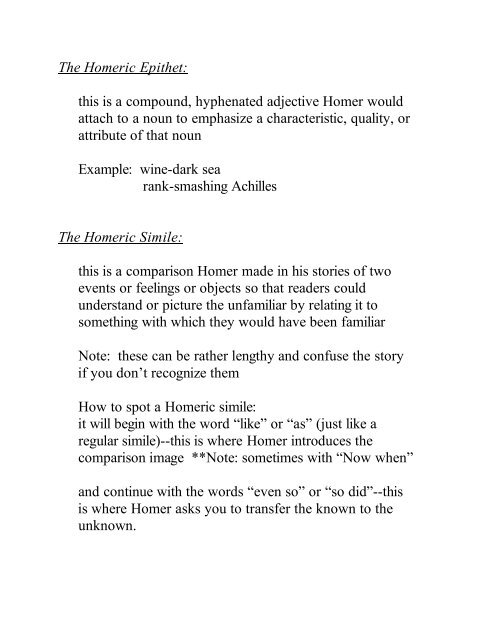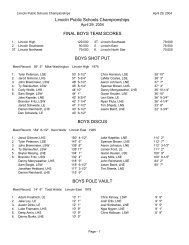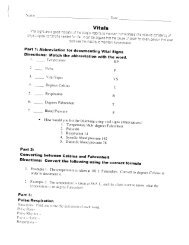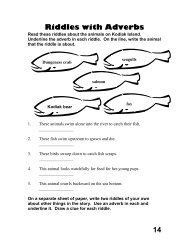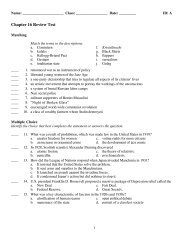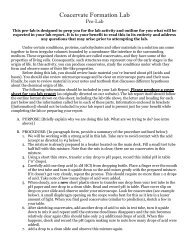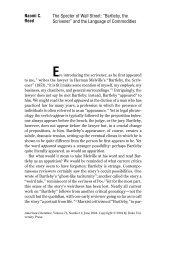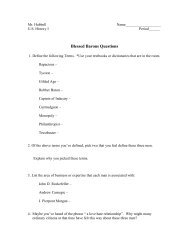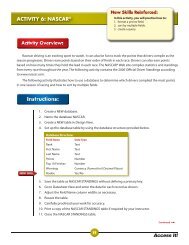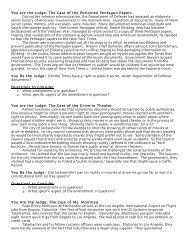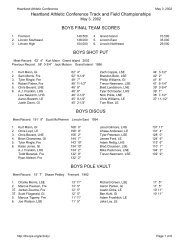Homeric epithet simile
Homeric epithet simile
Homeric epithet simile
Create successful ePaper yourself
Turn your PDF publications into a flip-book with our unique Google optimized e-Paper software.
The <strong>Homeric</strong> Epithet:<br />
this is a compound, hyphenated adjective Homer would<br />
attach to a noun to emphasize a characteristic, quality, or<br />
attribute of that noun<br />
Example: wine-dark sea<br />
rank-smashing Achilles<br />
The <strong>Homeric</strong> Simile:<br />
this is a comparison Homer made in his stories of two<br />
events or feelings or objects so that readers could<br />
understand or picture the unfamiliar by relating it to<br />
something with which they would have been familiar<br />
Note: these can be rather lengthy and confuse the story<br />
if you don’t recognize them<br />
How to spot a <strong>Homeric</strong> <strong>simile</strong>:<br />
it will begin with the word “like” or “as” (just like a<br />
regular <strong>simile</strong>)--this is where Homer introduces the<br />
comparison image **Note: sometimes with “Now when”<br />
and continue with the words “even so” or “so did”--this<br />
is where Homer asks you to transfer the known to the<br />
unknown.
Example: Book VI, p. 97<br />
“Now whenever Artemis the archer descends<br />
The high ridges of Mount Taygetus or Mount Erymanthus<br />
To joy in the chase of wild boars and the nimble deer,<br />
The heart of her mother Leto is filled with delight,<br />
For the rural nymphs, daughters of aegis-bearis Zeus,<br />
Join in the sport, and, although all are lovely,<br />
Artemis stands a head taller than any of the others<br />
And is easily known. Even so, that virgin Princess<br />
Shone among her ladies.”<br />
Compared: Princess Nausicaa and Artemis<br />
Comparison: Both are beautiful above their peers
English 9 Name(s)_________________________________________<br />
<strong>Homeric</strong> Similes Identification<br />
Directions: Read the following <strong>Homeric</strong> <strong>simile</strong>s found in The Odyssey. Underline the opening<br />
and concluding <strong>simile</strong> phrases (as per your notes); next, write a sentence or two identifying what<br />
two objects, events, sights, or feelings are being compared and finally, explain how.<br />
1. p. 88, Book V: Calypso and Odysseus<br />
He sprang through the waves and caught her, then crouched amidships,<br />
Avoiding sure death, while a great wave bobbled the boat<br />
This way and that with the current. As when in autumn<br />
the North Wind blows close-clinging balls of thistles<br />
About the fields, even so the winds were driving<br />
That boat of his this way and that on the sea.<br />
What two things are being compared? _______________________________________________<br />
______________________________________________________________________________<br />
Explain the comparison: __________________________________________________________<br />
______________________________________________________________________________<br />
______________________________________________________________________________<br />
2. p. 90, Book V: Calypso and Odysseus<br />
But when with fair-haired Dawn the third day came,<br />
The wind died down to a calm, and he, from the top<br />
Of a wave, looked hard ahead and caught sight of the shore<br />
Near by. And then as a dying man’s children are glad<br />
When the demon disease is broken and their father, who pined<br />
In pain for so long, is released from suffering and death<br />
By grace of the gods, even so Odysseus rejoiced<br />
At the sight of land and trees and swam on, more than eager<br />
To set foot on that shore<br />
What two things are being compared? _______________________________________________<br />
______________________________________________________________________________<br />
Explain the comparison: __________________________________________________________<br />
______________________________________________________________________________<br />
______________________________________________________________________________
3. p. 93, Book V: Calypso and Odysseus<br />
Odysseus, having suffered so much,<br />
Could hardly help gloating as he looked at that bed, and then<br />
He lay down in the middle and covered himself with dry leaves.<br />
As when a man on an outlying farm, a man<br />
With no neighbors, heaps ashes upon a live coal, that he<br />
May keep it alive and not have to go elsewhere for fire,<br />
Even so Odysseus covered himself with dry leaves.<br />
And Athena shed sleep upon him, that he might close<br />
Weary eyes and be free at last from all that toil.<br />
What are two things being compared? _______________________________________________<br />
______________________________________________________________________________<br />
Explain the comparison: __________________________________________________________<br />
______________________________________________________________________________<br />
______________________________________________________________________________<br />
4. p. 98, Book VI: Nausicaa<br />
So saying, the good Odysseus crept out from beneath<br />
The bushes and with his great hand reached into the thicket<br />
And broke off a leafy branch to hide his nakedness.<br />
Then on he went like a bold lion of the mountains<br />
who goes through wind and rain with his eyes of fire<br />
In search of cattle, sheep, or wild deer, and when<br />
His belly bids him right into the close-barred fold<br />
To attack the flocks therein. Even such was the need<br />
Of Odysseus as he went in his nakedness to approach that party<br />
Of girls with hair so beautifully braided.<br />
What are two things being compared? _______________________________________________<br />
______________________________________________________________________________<br />
Explain the comparison: __________________________________________________________<br />
______________________________________________________________________________<br />
______________________________________________________________________________
English 9 Name____________________________________<br />
<strong>Homeric</strong> Epithet Identification<br />
1. Find at least 4 <strong>Homeric</strong> <strong>epithet</strong>s used by Homer in The Odyssey and decipher its<br />
implication.<br />
Example #1: ________________________________________________________<br />
What do you think Homer is trying to say about this person or thing?____________<br />
__________________________________________________________________<br />
Example #2: ________________________________________________________<br />
What do you think Homer is trying to say about this person or thing?____________<br />
__________________________________________________________________<br />
Example #3: ________________________________________________________<br />
What do you think Homer is trying to say about this person or thing?____________<br />
__________________________________________________________________<br />
Example #4: ________________________________________________________<br />
What do you think Homer is trying to say about this person or thing?____________<br />
__________________________________________________________________<br />
2. Come up with an <strong>epithet</strong> that describes you or some object with which you are<br />
intimately familiar. Remember, the <strong>epithet</strong> should be hyphenated, and it should be<br />
poetic (stated creatively and with a flair for language). You MAY NOT use “blah”<br />
adjectives like “nice,” “good,” “tall,” etc. Make “tall” be “tree-bounding” or something.<br />
Creative + Novel = Good; Generic + Mundane = Bad.<br />
My example: _____________________________________________________<br />
What I’m saying about me/it:___________________________________________


